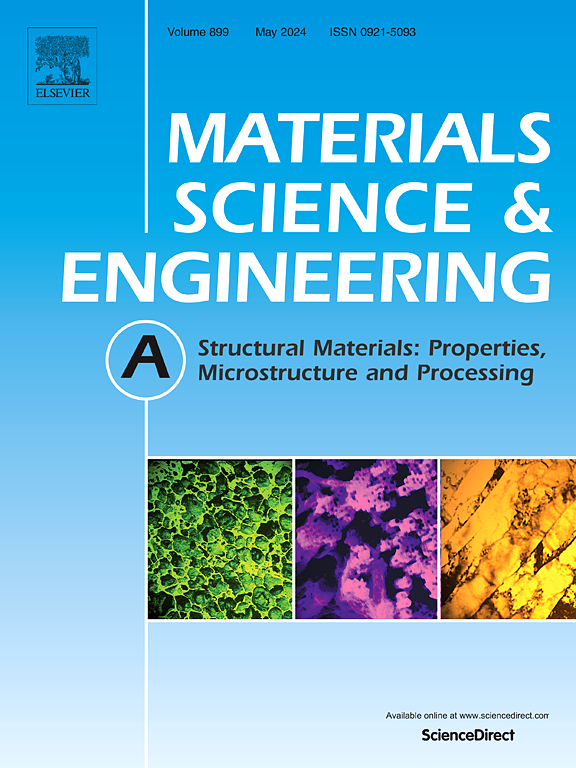Enhancing tensile and creep properties of Inconel 617 superalloy via regulating the synergistic evolution of M23C6 carbides and γ′ phases
IF 6.1
2区 材料科学
Q1 MATERIALS SCIENCE, MULTIDISCIPLINARY
引用次数: 0
Abstract
A novel heat treatment strategy, termed solution-double aging treatment (SDAT), is proposed to enhance the tensile properties and creep resistance at high-temperature of Inconel 617 Ni-based superalloy. This method aims to achieve a microstructure that maintains excellent thermal stability at elevated temperature up to 760 °C. The results suggest that the improved tensile properties of SDAT-treated alloys are attributable to orderly precipitation and synergistic interaction of M23C6 carbides and γ′ phases. Under identical creep conditions, SDAT alloys significantly enhance creep strength and extend creep rupture life in comparison to solution-treated (ST) alloys. Specifically, under creep conditions of 760 °C/170 MPa, SDAT alloys exhibit a 37.25 % longer creep rupture life than ST alloys, particularly under low-stress conditions. The enhanced creep properties of SDAT alloys are due to the unique microstructure produced by the SDAT treatment: the high-density and small-size of γ′ phases effectively impede dislocation movement, thereby reducing the minimum creep rate; the evolution of cylindrical coarse M23C6 carbides predominantly occurs near grain boundaries or within grains, reducing the formation of creep cracks; the high proportion of grain boundary M23C6 carbides mitigates creep damage caused by carbide evolution, inhibiting the initiation and extension of grain boundary cracks. The SDAT heat treatment process provides a novel approach to improving the creep life of Ni-based superalloys by controlling the synergistic evolution mechanisms of carbides and γ′ phases.
通过调节 M23C6 碳化物和 γ′ 相的协同演化提高 Inconel 617 超耐热合金的拉伸和蠕变性能
为提高 Inconel 617 镍基超合金在高温下的拉伸性能和抗蠕变性,提出了一种新的热处理策略,即固溶-双时效处理(SDAT)。这种方法的目的是获得一种在高达 760 °C 的高温下仍能保持优异热稳定性的微观结构。研究结果表明,SDAT 处理合金拉伸性能的改善归因于 M23C6 碳化物和 γ′ 相的有序析出和协同作用。在相同的蠕变条件下,与溶液处理(ST)合金相比,SDAT 合金能显著提高蠕变强度并延长蠕变断裂寿命。具体来说,在 760 °C/170 兆帕的蠕变条件下,SDAT 合金的蠕变断裂寿命比 ST 合金长 37.25%,尤其是在低应力条件下。SDAT 合金蠕变性能的增强得益于 SDAT 处理所产生的独特微观结构:高密度和小尺寸的 γ′ 相有效地阻碍了位错运动,从而降低了最小蠕变速率;圆柱形粗大 M23C6 碳化物的演化主要发生在晶界附近或晶粒内部,减少了蠕变裂纹的形成;高比例的晶界 M23C6 碳化物减轻了碳化物演化造成的蠕变损伤,抑制了晶界裂纹的产生和扩展。通过控制碳化物和γ′相的协同演化机制,SDAT热处理工艺为提高镍基超合金的蠕变寿命提供了一种新方法。
本文章由计算机程序翻译,如有差异,请以英文原文为准。
求助全文
约1分钟内获得全文
求助全文
来源期刊

Materials Science and Engineering: A
工程技术-材料科学:综合
CiteScore
11.50
自引率
15.60%
发文量
1811
审稿时长
31 days
期刊介绍:
Materials Science and Engineering A provides an international medium for the publication of theoretical and experimental studies related to the load-bearing capacity of materials as influenced by their basic properties, processing history, microstructure and operating environment. Appropriate submissions to Materials Science and Engineering A should include scientific and/or engineering factors which affect the microstructure - strength relationships of materials and report the changes to mechanical behavior.
 求助内容:
求助内容: 应助结果提醒方式:
应助结果提醒方式:


